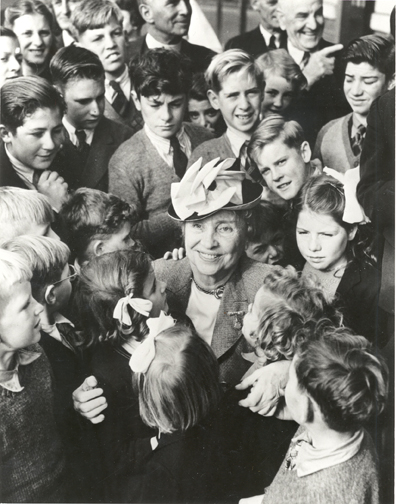We are delighted to present the first of the many blog posts that will appear over the next two years as part of the Helen Keller Digitization Project. We are kicking off with a post by Kim E. Nielsen, professor of Disability Studies at the University of Toledo, and Helen Keller expert. Enjoy!
Every year my spring is marked by phone calls, emails, letters and Skype conversations about Helen Keller initiated by nervous middle- and high-school students. These participants in National History Day, an annual program in which over half a million students conduct historical research on topics of interest to them, chose Helen Keller. Over and over again, hundreds of young people choose Helen Keller.
When I ask them why they chose Helen Keller the students, nearly always wary of the Historical Expert their teacher required them to contact, explode with excitement. "I never knew..." their enthusiasms always begin. They begin their projects assuming that Helen Keller would be vaguely interesting (or an easy topic), but once they start learning about her life and activism they can't stop. They seek models of disabled people different from either the eternally cheerful overcomers or pathetic victims they see too often in popular culture. They seek models of disabled people who resisted ableism and lived full lives. They seek models of activism, passion, and a commitment to justice. And in their searches they find that Helen Keller was far more complicated, far more interesting, and far more human than they ever anticipated.
What follows "I never knew..." varies from student to student, depending on their own passions. Some are attracted to Keller’s feminism, her love of dogs, her fierce internationalism, her religious faith, her disgust at economic inequalities, and even her appreciation of food and scotch. What does not vary, however, is the belief of young students that Helen Keller matters—to them as individuals, to those who identify as disabled and those who don’t, and to the world as a whole.
This year, what followed "I never knew..." nearly always included a reference to this summer’s 25th anniversary of the Americans with Disabilities Act. Though Keller died long before the 1990 passage of the ADA, students realize that Helen Keller, along with so many others, helped to lay the groundwork for this pivotal and important civil rights legislation. The nervous middle- and high-school students I speak with know that their lives and their futures have been made better by the Americans with Disabilities Act.
The Helen Keller Archival Collection at the American Foundation for the Blind is a great place to start learning what one never knew.
Image: Helen Keller surrounded by school children in Melbourne, Australia, 1948
